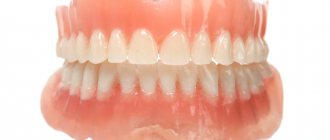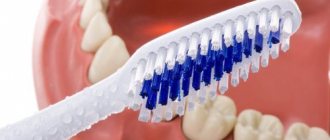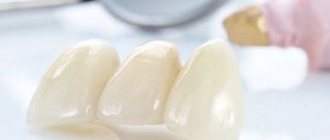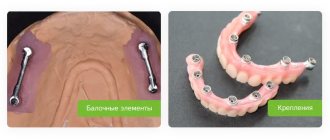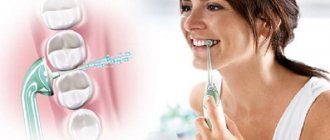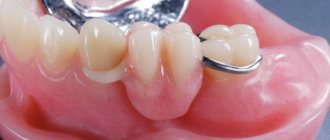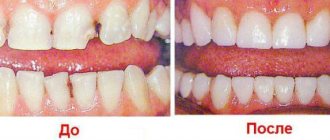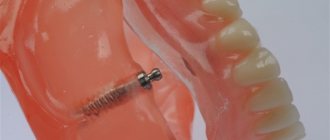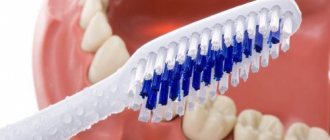Types of nylon prostheses
Did you know that after losing teeth it is very important to get dentures as soon as possible?
Over time, changes occur in the oral cavity and tissues atrophy. This is not to mention aesthetics and harm to digestion. Nylon dentures are a comfortable and effective solution.
There are 2 types of nylon prostheses.
- Partial - if several dental units are missing.
- “Butterfly” - replaces one tooth.
Material When creating such prostheses, dental nylon is used. This material is very similar in appearance to real tissue and almost completely merges with the mucosa. A stranger will hardly be able to say with certainty whether your teeth are “their own” or artificial. The product is fixed to the supporting teeth using soft clasps.
What is a nylon prosthesis?
This is an orthopedic structure that replaces missing teeth and can be independently removed by the patient from the oral cavity. Its frame imitates gums in color and structure, and the artificial teeth themselves are placed on a solid base. An alternative to nylon dentures is acrylic structures, but they often cause discomfort in the oral cavity and can cause an allergic reaction to the material.
The advantage of nylon structures is their flexibility and softness. They are used as a temporary measure before implantation or as a permanent replacement for missing teeth in cases where there are contraindications to implantation or the patient has financial difficulties. A nylon prosthesis lasts for about 5 years.
Varieties
All prosthetic dental structures, depending on their qualities, are divided into several varieties. This also applies to nylon dentures. Their sizes and shapes are determined by the number of missing crowns in the dentition. In addition, the type of prosthetic structures depends on the number and nature of various jaw defects. Based on this, nylon dental structures are divided into the following types:
- Single. Their shape is similar to a butterfly. Such dentures are attached to the gums using special devices - clasps. Single dentures are used in the absence of one crown or to correct the defect of one tooth.
- Partial. Such nylon dentures are used in the absence of several crowns. The structure is secured using several supporting teeth.
- Full. They are intended for use in cases of complete absence of teeth. They can be installed on both the upper and lower jaw. A complete nylon prosthetic structure is much stiffer than a single and partial one. It is attached to the gum using a chamber system.
Main advantages of the material
Nylon is lightweight and non-toxic material. Dentures made of nylon do not create the sensation of a foreign object in the mouth, and under the influence of the owner’s body temperature they can soften and become flexible. For the same reason, nylon dentures are resistant to stress during chewing.
The shape, color and design of the soft nylon denture base are matched to the shade of the patient's gums, so it is almost invisible.
To install a nylon removable structure, it is not necessary to grind adjacent teeth. It is attached to the teeth using dentoalveolar clasps (clasps or hooks) made of the same nylon, which are a natural continuation of the prosthesis and are invisible when smiling and talking. This makes it possible to carry out prosthetics in the most difficult areas of the jaw from an aesthetic point of view.
But it is worth considering that nylon dentures do not perform the chewing function very well, since when they soften under the influence of temperature, they lose the hardness necessary for processing food.
Advantages of nylon prosthetics
The method of using nylon to create dental prostheses is relatively new. Artificial nylon “gums” with teeth installed in them are made using computer modeling, so the products are highly accurate. The advantages of prostheses include:
- Naturalistic appearance - translucent nylon is absolutely invisible on the gums, so others will not suspect that there is a denture in the person’s mouth.
- High biocompatibility - the absence of metal and acrylic components allows the product to be used for dental restoration in patients with intolerance to the listed compounds.
- Comfort - a nylon prosthesis is the softest of all designs used in modern dental orthopedics. This means that getting used to it, other things being equal, will be minimal in terms of time and severity of discomfort.
- A relatively affordable price, especially when compared with a method of dental restoration such as implantation - a nylon prosthesis for all teeth will cost much less.
Indications and contraindications
Indications for installation are the loss of teeth (one, several or all), especially if the patient cannot have implants installed. But there are also contraindications:
- periodontal disease grades 3 and 4, in which the tissue around the tooth is completely destroyed,
- low crown height of abutment teeth,
- inflammatory process of the mucous membranes or gums,
- high gum mobility,
- significant bone tissue atrophy,
- Recession is the receding or overgrowth of the gums.
Prosthetics with complete edentia
Often dentists are faced with the fact that patients ask for flexible nylon dentures, despite the fact that they are missing all their teeth. It would be wrong to talk about the impossibility of manufacturing such structures. In theory and in practice, this is possible, but the patient himself must be prepared for the fact that the production of this system will take a long period of time, and such a system will be more expensive financially. In addition, there are other nuances in the operation of flexible prostheses that also need to be taken into account.
- The softness of the material is a good quality for a prosthesis, but not for complete prosthetics. Discomfort from soft systems will begin to appear when eating food. If structures made of hard materials take half the load onto their base, then with nylon dentures this load is completely redirected to the gums. As a result, wounds form on the soft tissues of the gums, which first begin to hurt and then bleed.
- Flexible nylon systems are attached to the supporting teeth. In cases where all teeth are missing, the system has to be fixed with adhesives, and this brings the patient a constant feeling of discomfort. Few consumers are able to overcome the constant feeling that the jaw may fall out with any movement.
- Constant loads on the jaw lead to its subsidence. Every year it decreases by about 1 mm. As a result, after 2 years the structure becomes unsuitable for use and has to be replaced. Manufacturing a new system again costs money and time.
Considering the above disadvantages, experts recommend prosthetics for complete edentia with structures that are characterized by greater rigidity of the material used.
Other pros and cons of a nylon prosthesis
- Affordable price.
- Quite high aesthetic properties.
- Long-term preservation of the original shape and color when worn.
- Non-toxic material.
- No foreign odor in the mouth.
- Moisture resistant.
- Reduced quality of food processing.
- Some transparency of the material: teeth can be seen through the base at the junction.
- The appearance of cracks and scratches due to improper care.
- Periodic cleaning in laboratory conditions is recommended.
- Over time, the structure becomes deformed and requires replacement.
- Relatively short service life (this issue should be discussed carefully with your doctor).
Negative sides
Nylon dentures are expensive. Similar rope and plastic structures will cost less. But the inflated price is not the only drawback.
Disadvantages of nylon dentures:
- Care features. The structure made of nylon cannot be cleaned with ordinary hygiene products. A toothbrush can damage the surface by scratching it. Through these damages, the material will begin to absorb moisture and various odors, forming persistent stains and provoking the onset of the development of inflammatory processes under the structure.
- The softness of the product makes the prosthesis movable when worn. This affects the atrophy of bone tissue - the jaw begins to “sag”. Two millimeters of sagging bone tissue makes the structure unusable and has to be replaced. If you ignore the timing of replacement, the clasps that hold the prosthesis will begin to cut into the mucous membrane and thereby injure it.
- The flexibility of nylon does not allow the load to be evenly distributed during eating, this causes pain, and the prosthesis itself is subject to deformation. But this drawback applies to those structures that are made for the absence of a large number of teeth. A system that covers one or two missing units will not cause such inconvenience.
- Deformation of the denture when chewing food makes it necessary to undergo the adjustment procedure several times.
- The percentage of a nylon prosthesis that breaks is small, but if this happens, the product can no longer be repaired. We have to completely replace the structure.
Another disadvantage of nylon flexible prostheses is grinding. These products cannot be sanded on those parts of the structure that will come into contact with the tissues of the oral cavity. Plaque begins to accumulate in these places, which will cause an unpleasant odor. This can only be avoided by properly organized denture care.
Nylon prostheses as an alternative to acrylic analogues
The choice of nylon as a material for removable dentures is due to two main reasons.
- Acrylic is an allergen in some cases, while nylon has no residual monomer and is a completely biocompatible material.
- Nylon dentures are the most adequate replacement for clasp dentures when the patient is allergic to metal.
However, in rare cases, nylon dentures can still cause undesirable reactions, which manifest themselves in the form of irritation of the gums under the denture and swelling of the mucous membrane. Sometimes experts note the formation of an extraneous bite in patients.
Disadvantages of flexible nylon dentures
However, the same features of the prosthesis that determine its advantages, on the other hand, become disadvantages:
- Due to its flexibility and elasticity, nylon does not distribute the load on the tissue of the alveolar process throughout the entire jaw, and therefore does not prevent bone atrophy. In this regard, clasp dentures are better than nylon dentures, because their rigid base contributes to a more correct transfer of load to the jaw bone.
- Soft nylon does not provide a long service life; the product cannot be restored or repaired; if it breaks, it must be replaced.
Caring for nylon dentures
Caring for removable nylon structures is quite simple.
- It is necessary to clean the denture daily with a special cleaning agent. The finished product in liquid form can be purchased at a pharmacy or diluted with water if it is sold in powder form. Often, this type of cleaning can be done by simply placing the removable structure in the solution overnight.
- As for daytime care, after eating it is enough to remove and treat the prosthesis with a special solution and a manual brush. When this is not possible, rinsing with ordinary water from a filter or after boiling is suitable. You can also clean dentures in the mouth with a regular toothbrush, but in this case you will have to switch to a special toothpaste.
Questions/Answers
1
Three months ago, a plate acrylic prosthesis was made for my upper jaw. I still have to get used to it, and most likely I won’t be able to anymore. Most of the time it lies in solution, it is impossible to wear it, the gag reflex is increased. Is there a chance that it will be better with a nylon prosthesis?
Nylon dentures are actually softer than acrylic plastic. It gently grips the gums, fits well, and due to its elasticity does not rub the gums. However, with a strong gag reflex, it is important to understand that any prosthesis will take time to get used to.
2
Is it possible to install a nylon prosthesis instead of two extracted teeth?
Yes, you can. Just don’t wear this design for too long if you plan to have teeth implanted in the future. The bone can quickly “go away” under a nylon prosthesis and further implantation will require additional replanting of bone material.
How much will prosthetics cost?
Prosthetics usually take place in several appointments with a doctor. During the first visit, the patient will have a consultation with an orthopedist and a dental technician, diagnostics, history taking and impressions taken for the manufacture of an individual prosthesis. These services are not included in the cost of the prosthesis and are paid additionally. At the next appointment, the manufactured structure is tried on and adjusted, and recommendations for its care are received.
The price of a denture made of nylon is higher than its analogue made of plastic. Partial replacement of missing teeth in Moscow will cost about 15,000 - 20,000 rubles, complete replacement - about 50,000 rubles. Please note that clinics provide different warranty periods for finished structures. Choose the option that seems most suitable to you.
Main misconceptions associated with nylon prostheses
1. Nylon dentures are a new word in dentistry; they have replaced outdated plastic dentures.
Acrylate was introduced into dentistry in 1937.5 Nylon - in 1955.6 The first is 80 years old, the second is 60. Although nylon is younger, calling it new and ultra-modern after more than half a century is somehow not entirely appropriate. It appeared in Russia at the beginning of the 21st century (however, it was not very popular in other countries in the last century).
2. Nylon prostheses are hypoallergenic and more biocompatible
The frequency of allergic reactions and toxicity of acrylic prostheses depends on their production technology. If they are manufactured correctly, there is no excess of residual monomer, then their toxicity tends to zero, just like that of nylon ones. Allergies are very rare in both (patients and doctors often call any intolerance an allergy, and in the vast majority of cases it is called a toxic reaction). A cytotoxicity study demonstrated comparable levels of toxicity for both materials.7
3. Nylon dentures do not shrink, and therefore are more accurate than acrylic ones (which take a long time and are difficult to adjust)
In fact, nylon has a polymerization shrinkage of 2.5% in the transverse dimension, which is 2.8 times that of acrylic. It is much easier for the dentist to simply place a flexible prosthesis on the jaw due to its elasticity. An acrylic prosthesis does not forgive errors of this magnitude.8
4. Nylon prosthetics are banned in Europe
No, they are not banned in Europe. Nylon prostheses do not cause direct harm to the body. They are simply not used often, since the education of dentists there is better than in Russia. European dental universities study in detail the properties of materials and the requirements for an optimal removable denture. And they not only study, but also strictly ask their students. Therefore, it is more difficult for companies producing dental materials to fool a certified doctor and persuade him to use a design of dubious quality for his patients.
5. The price of the worst product cannot be higher
The cost of a nylon prosthesis is significantly higher than that of an acrylic one. If it has so many shortcomings, then why is it so much more expensive? This seems strange and illogical. Psychologically, many people cannot believe that a cheap product can be better than a similar expensive one. Even after listening to the explanations, many do not perceive them. Therefore, we will try to analyze in more detail the economic background of this phenomenon.
Acrylic plastic turned out to be so superior to previous materials (in different centuries these were wood, ivory, gold, porcelain, vulcanite, aluminum, celluloid, bakelite, stainless steel, etc.) that after its appearance it quickly replaced them throughout the world. Also in the Soviet Union, methacrylate was appreciated and widely introduced into medical practice. So widespread that all removable dentures were made from it. Over decades of using this type of plastic, considerable experience has been accumulated; the production technology has been carefully polished and achieved quite a worthy result. Medicine in the USSR was free, the state provided its citizens with removable dentures at its own expense. Citizens are accustomed to this, and the idea of paying for something that seems to be free of charge is perplexing to many.
After the collapse of the Soviet Union, nothing changed fundamentally. Russian citizens could still receive acrylic prostheses completely free of charge. Private dental clinics were not forbidden to offer the same designs for a fee, but it was difficult to ask for a high price for them. Elderly people (they are the majority of consumers of this product) are usually less wealthy and more tolerant of the shortcomings of free services in the district clinic than the younger generation. The expensive price confuses them more, so in paid clinics the cost of acrylic prostheses has been established at a fairly moderate level (relative to other types of prosthetics).
An alternative technology with clear advantages for patients (the prosthesis does not break, does not rub, there are no metal hooks) in the absence of competition from free clinics has begun to be successfully promoted. Aggressive marketing (keeping silent about the shortcomings or presenting them as insignificant) made it possible to raise the cost of nylon prostheses to the level at which acrylic prostheses should logically be.
How to properly clean removable dentures?
To clean plaque from a denture, it must be removed from the mouth. The denture is cleaned with a toothbrush or other convenient brush. For good cleaning of dentures, ordinary soap is best suited.
Removable dentures must be cleaned according to certain rules. First, we clean the denture from the outside (from the side of the artificial teeth). After that, be sure to thoroughly clean the inner string (on the side that is adjacent to your gums). Cleaning the inside of the denture is often not given due importance.
Afterwards, the prosthesis is washed well with soap and water.
You should also rinse your mouth thoroughly. And only after this the prosthesis can be put on again.
Features of care
Although nylon dentures cannot be treated with regular toothpaste, they are easy to care for. Every day they need to be placed in a medical antiseptic solution. You can purchase the product at any pharmacy. You can also find special powders on sale. They must be diluted with water in certain proportions.
The product should remain in liquid all night. In the morning, you need to remove it, rinse it with running water and place it in your mouth.
During the day, it is advisable to rinse the denture after each meal to prevent food debris from accumulating in it. If it is not possible to carry out a hygienic procedure (it is clear that no one wants to take the product out of their mouth in public places), you should simply rinse your mouth with warm water.
Every year, a patient using nylon teeth should come for a consultation with a dentist. If discomfort or pain occurs while wearing, you should visit a doctor immediately. The base may have become warped or damaged. Then you urgently need to make a replacement.
